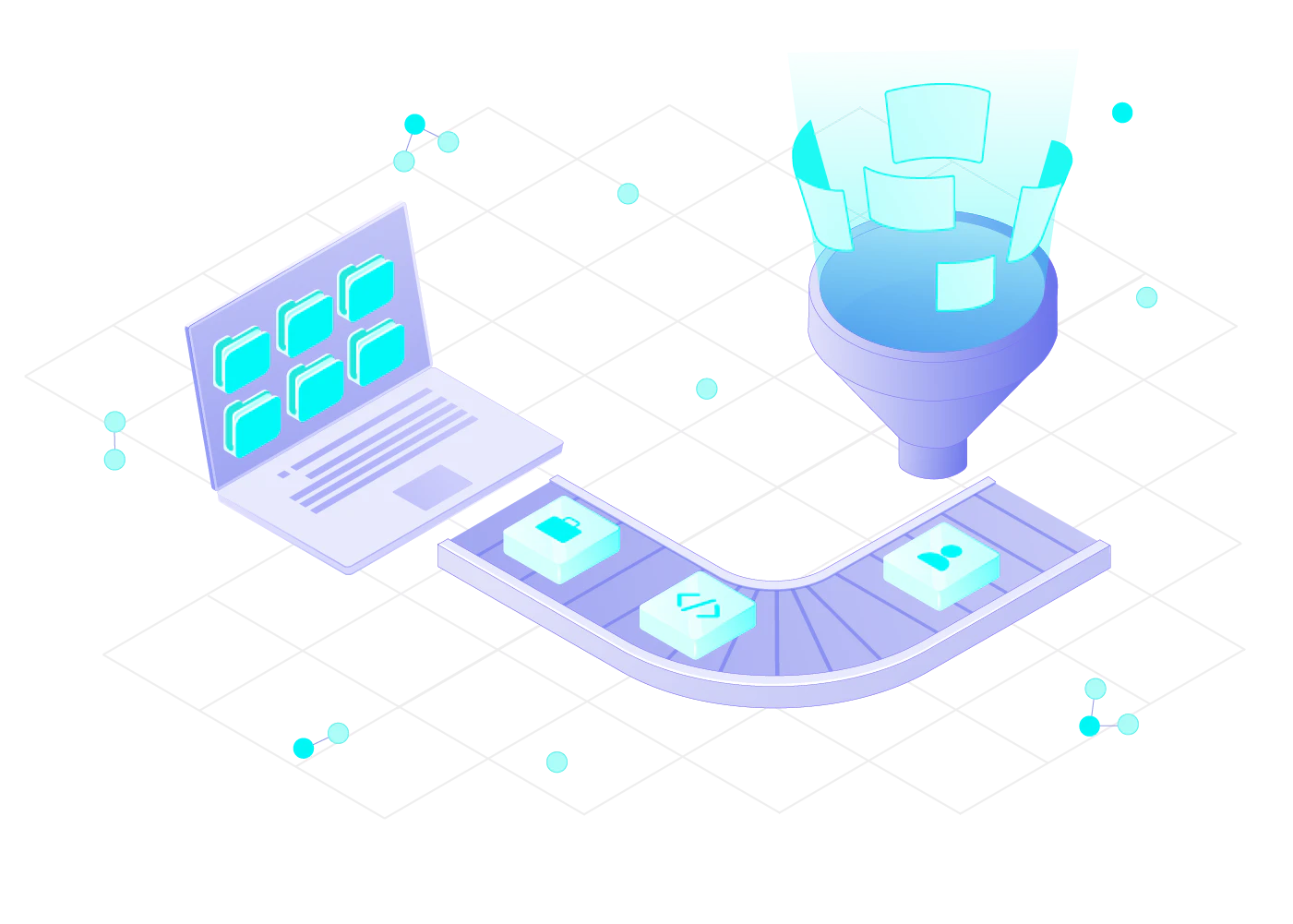Finding the right data provider is one of the most critical steps in working with public web data. The products you're building or the insights you extract are only as good as the data it's based on.
Because collecting public data and its maintenance is challenging due to constant changes and the volumes of data involved in the process, it's essential to work with a reliable provider.
What defines a good data provider?
A good data provider focuses on offering the most suitable data solution for your use case, provides necessary resources for making an informed decision, and helps you get the most out of the data you're buying.
The fundamental principle of building a successful partnership with a data provider is relatively straightforward: take your time, do your homework, and don't settle for anything less than a top-notch option.
There are multiple layers to assessing data providers and securing a successful partnership. The key ones are selecting the right data, ensuring that the provider is reliable, and testing service quality.
Additionally, consider factors like experience, flexibility, stability, and pre-purchase and post-purchase stage support.
Most importantly, a good data provider will be happy to assist you in choosing the most suitable data solution, integrating it into your data pipeline, and then maximizing the value of your data with the help of dedicated account managers or technical support.
How to choose data provider: 5 key things to consider
To help their clients get the most out of their data, providers need to be experienced, adaptable, and consistent. We're sharing 5 questions that will help you choose the right vendor for your business.
1. What data do you offer?
Now this might seem like an obvious question, but as the big data analytics market keeps growing, there's a myriad of web data solutions and even more ways to process and package the same web data.
When choosing B2B data, in our experience, the most important aspects to consider are:
- Sources
- Coverage
- Quality
- Data delivery options/formats
- Freshness
First, find out what you can do with this data by getting familiar with the product and its use cases in the B2B market.
Say you need raw datasets. The definition of "raw" may vary between companies because of how it's collected, how it's processed, and how it's presented.
Before purchasing data, you need to know if you want to handle all the analytics yourself or if you are open to working with data that went through additional processing and transformations. For instance, are you interested in using data that combines multiple sources or contains derivative data fields.
In some cases, analytics is done on the provider's side. If the data provider specializes in working with companies in your industry, it might result in additional value for your business. However, in some cases, it may not suit your use case.
If you're interested in very specific data, for example, scraped data from one source, you will care about how truthful this data is. It's important to know if the data you're getting is as close to the original data source regarding its completeness and structure.
The next thing you want to ask about is what data processing the data vendor is doing. For example, Coresignal offers both raw and clean data.
Our clean datasets contain filtered, unified, and standardized data, which is also enriched with the help of AI. Clean data offers benefits like quicker time to value, easier processing and onboarding, and additional data fields.
Raw datasets, on the other hand, are heavier, contain more records, and include elements like special symbols—valuable to some companies and completely unnecessary to others. That's why asking about this is so important.
We also offer other data solutions like our Startup data, which contains clean and aggregated data on startup founders.
It's an excellent option for investors who need a quicker way to get insights. Still, some investors want to build their analytics process with raw data from scratch, meaning that any logic that goes into creating a specific dataset might not suit them. Those investors should choose raw datasets.
2. How fresh is your data?
In the web data industry, needing a one-time purchase of a large-scale web dataset that hasn't been updated for a while is rare because information about businesses and professionals changes fast. That's why most companies are looking for fresh and regularly updated data.
Suppose you need to track changes and see updates and/or new data records in data on business professionals working in specific industries. In that case, this is an essential criterion to apply to your selection process when looking for a data vendor.
Besides checking if data is fresh, it's essential to know how and how often the data provider updates datasets.
Here are some additional questions that might help you get more information about how the company is ensuring data freshness:
- What part of your datasets do you update, and how often?
- How many new records do you add with every update, and how often?
- How do you prioritize what to update?
Keep in mind that keeping data fresh requires expertise and experience; therefore, by getting information on freshness, you're also getting a closer look at the provider's capabilities.

3. How can I test your data before commiting?
There should be a way for you to get a data sample, a trial run, or access to detailed information about the data you're getting before purchasing.
At Coresignal, we offer all of the above. Those interested in our database APIs can even start with 200 free credits.
This is important because you get to see if the data will suit your use case and sometimes even examine the data quality. A lot of companies will happily provide an opportunity to test data based on a request from you.
Compare this data to what you already have, and check if it meets your criteria. Evaluate the potential costs of integrating such data into your pipeline. Pay attention to data quality.
These are just some of the things you can do while testing.
As for detailed information, as funny as it sounds, you should also get some access to data on data. For example, you should be able to find out how much data a provider offers, how much of that data is being updated and how often, geographic coverage, etc.
Besides providing you with information relevant to your purchase decision, this also tells a lot about what you can expect in the future. Operational transparency is vital if you prefer to build a long-term partnership with a data provider.
4. Is your data scalable?
We recommend getting the best option you can get for your business now but also planning for the future.
This is more of a question for yourself than the data vendor, but nevertheless an important one. Will this data provider be able to support the scaling of your product?
Say you are starting with data on companies, but later on, you might benefit from additional data on their workforce, products, or tech stack. Or if you start with a dataset that covers one country, will there be a possibility to get data covering a whole region?
Another related aspect is customization. If your business will need a custom solution, say, a different format outside of the provider's offering in the future, will this option be possible?
You may also consider having more than one provider at once or working with one provider temporarily before your business grows to a certain point.
5. What security and compliance measures do you have in place?
Compliance and data security are also important aspects you should consider.
Data providers must always be ready to adapt to changes, including new legal requirements, which are among key challenges they face in the industry.
Therefore, you should find out about their data privacy and compliance practices. Some data providers, including Coresignal, have made this information available on their websites. In other cases, you will need to ask for this information when speaking with the sales team.
When it comes to data security, keep in mind that when you’re using data solutions like APIs there’s two-way communication, which means that security breaches on the provider's side can also affect you as they can leak commercially sensitive data you're sharing.

Other factors that help assess data providers
Now that we've covered red flags related to the data provider's reliability, you may also be interested in green flags.
Knowledge sharing
In our experience, professional data vendors are willing to share their expertise with you.

Effective communication
As in any other industry, we recommend you pay attention to the communication and the support you're getting while you're figuring out if a particular data solution is right for you.
If you are building a new platform based on web data from a new provider, you must be sure that they will communicate with you promptly and smoothly.
Social proof
Check if a data provider has listings on data marketplaces, and check reviews, testimonials, social media, and social proof elements on their website that reflect the experience other companies had with the data provider you're considering.
Future-proof
In addition to the above, innovation is one of the green flags that make a good data provider stand out. Companies that work with public web data find more and more ways to leverage AI to save time or build new products.
The importance of AI will likely stay. Therefore, it is essential to choose a data provider that cares about future-proofing its teams and products. Consequently, this will help you grow and keep up with changes.
For example, Coresignal already offers AI-enriched datasets that help companies save time and get extra value from web data.
Conclusion
Choosing a data provider is one of the most critical steps in building a data-driven business. Challenge potential data vendors with your questions. Good data quality? So what? What does it say? Dig deeper to find out what makes a data provider stand out, and take time to evaluate the opportunities a particular data purchase will bring you.


































